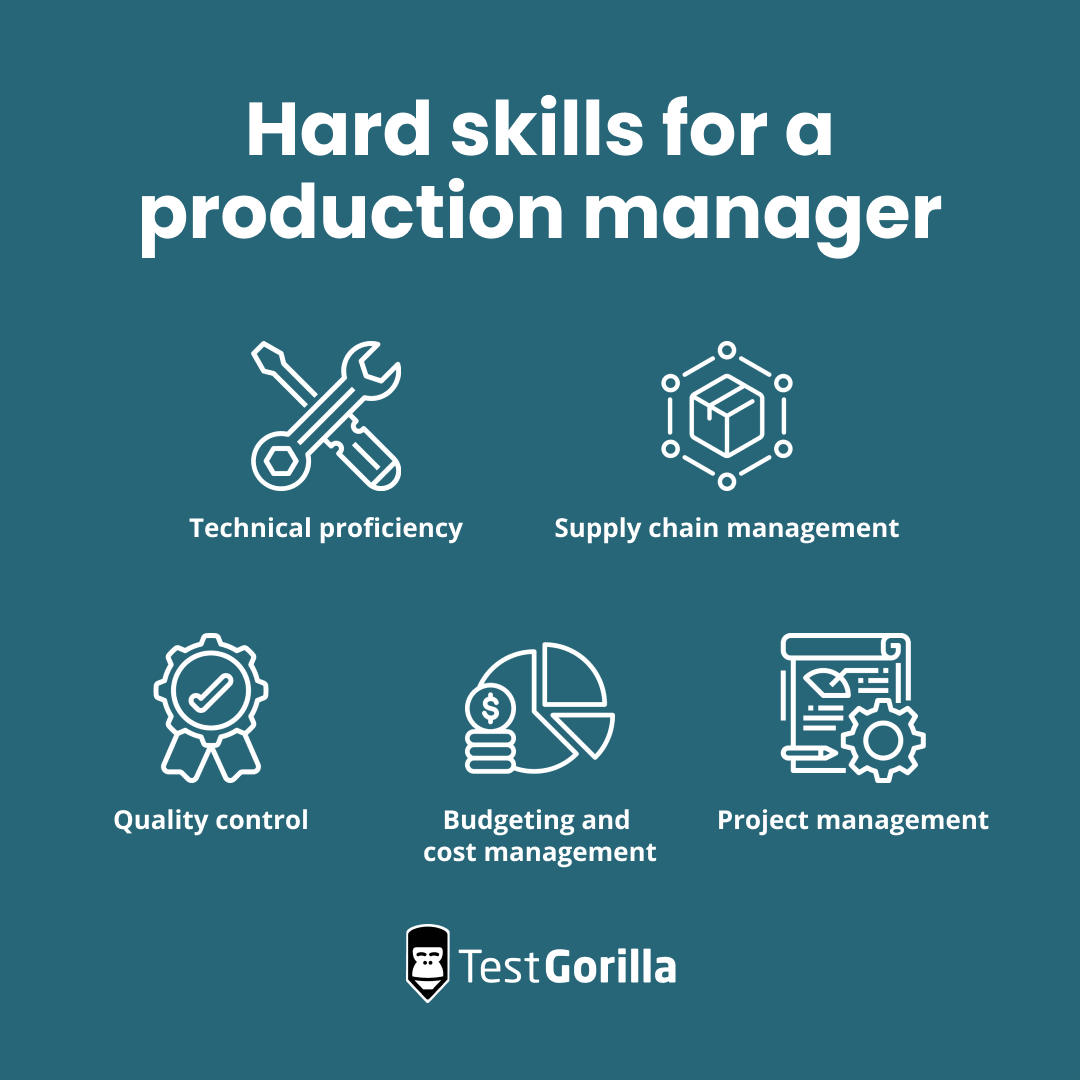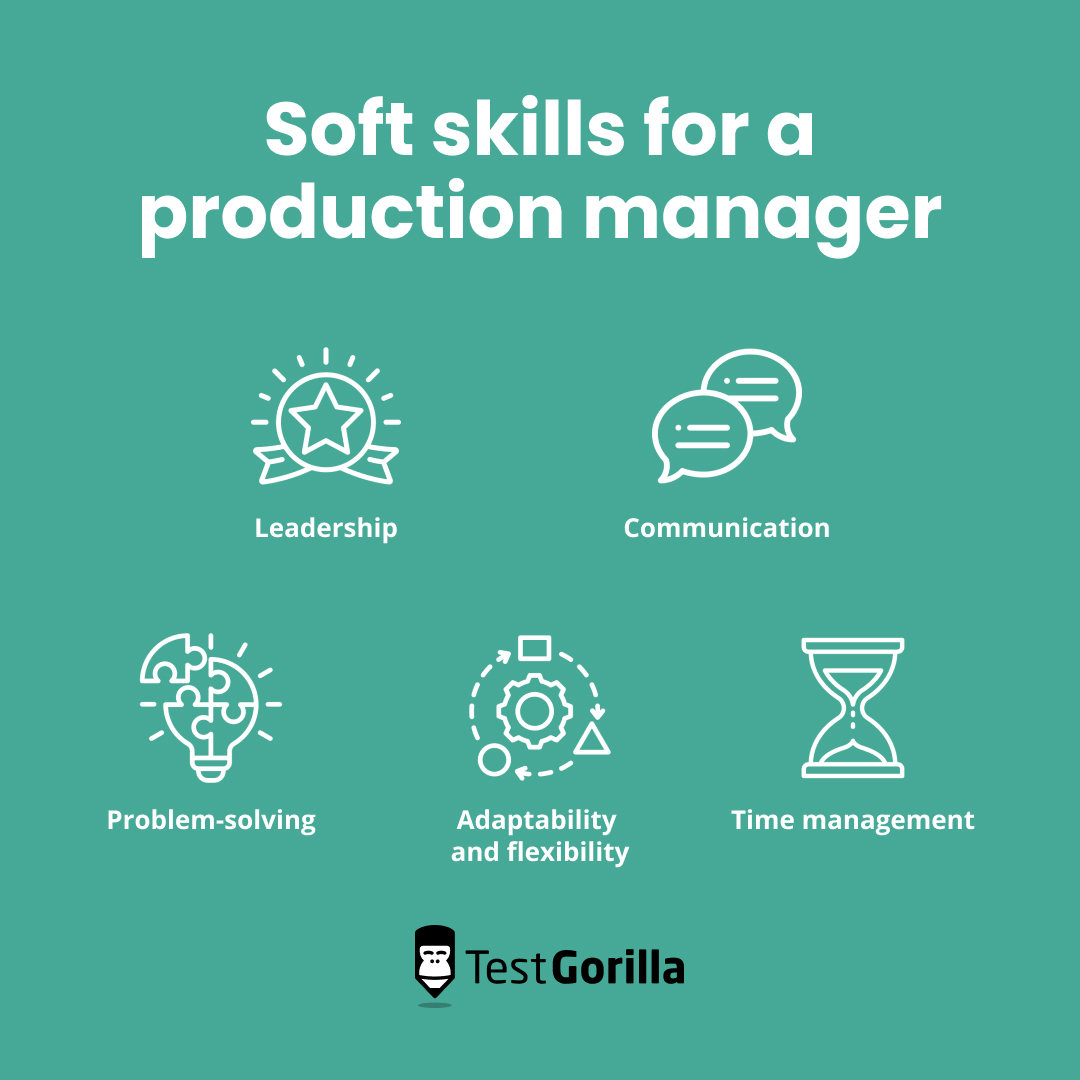Within any organization that produces goods – be it food, clothing, consumer electronics, or something entirely different – there are a multitude of operational tasks and processes that drive its success.
From the transformation of raw materials into finished products to the coordination of different workflows and teams, each step of the production process requires meticulous management to ensure consistent quality.
The production manager is the person who is at the center of this complex network, responsible for maintaining an uninterrupted production chain. They make sure everything goes smoothly and according to plan – and that your products can live up to your customers’ expectations.
If you’re looking to hire a production manager for your organization, you’ve come to the right place.
Below, you’ll find a detailed guide to help you hire the best production manager. You’ll learn about:
What the role of a production manager entails
What skills to look for in a production manager and how to use skills-based hiring
Where to find qualified candidates and how to evaluate them
What interview questions to ask
What the average salary for the role is, and more
Table of contents
- What is a production manager?
- Hard skills for a production manager
- Soft skills for a production manager
- How to test production manager skills
- Production manager interview questions
- Where to find production managers
- The average salary of a production manager
- Production manager job description template
- Hire the best production manager, stress-free
What is a production manager?
In short, a production manager is the orchestrator of a company’s manufacturing process.
They are responsible for planning, scheduling, coordinating, and organizing the production activities that transform raw materials into finished goods.
They also make sure finished products meet your quality standards and are delivered on time and within budget, in coordination with supply chain managers and other supply chain specialists.
Production managers also oversee the maintenance and repair of different machines and equipment. Their experience, skill set, and direction are essential for the safe production and delivery of goods.
Hard skills for a production manager
Production managers need several key hard skills to be successful in their role. Here are the most important ones:
Technical proficiency
A skilled production manager must have strong knowledge of the technical aspects of production relevant to their industry. They should understand the functioning of the machinery, tools, and technologies used in the production process.
Look for candidates who have a track record of implementing and using these technologies successfully to improve efficiency and output.
Supply chain management
For a successful production lineup, efficient supply chain management is crucial. A skilled production manager must have a good understanding of supply chain dynamics and must be an expert in tasks such as:
Inventory management
Demand forecasting
Supplier relationship management
Look for candidates who have experience in streamlining the supply chain, reducing lead times, and optimizing inventory levels.
Candidates who can strategically plan and execute supply chain processes to minimize disruptions are particularly valuable and will work well with your supply chain team. Hint: if you still need to recruit one, head on to our guide to supply chain recruitment.
Quality control
Quality control is a top priority for production managers as it enables them to maintain and enhance product quality. For this, they must have:
Solid knowledge of industry-specific quality assurance standards and testing methodologies
A proven track record in implementing and overseeing quality control processes
Look for candidates who know how to identify quality issues early on in the production process and implement corrective measures as needed. They need to know how to collaborate with the quality assurance team, conduct thorough inspections, and ensure consistency in product quality.
Budgeting and cost management
Financial acumen is a critical hard skill for a production manager. They must be adept at managing budgets efficiently, controlling production costs, and optimizing resource allocation to improve the bottom line.
A skilled production manager will know how to:
Analyze expenses
Identify areas for improvement
Implement strategies that maximize operational efficiency while reducing costs
Shortlist candidates that have a track record of managing production budgets, maintaining product quality, and negotiating with suppliers to get favorable contracts.
Project management
This is perhaps the most important skill for any production manager. Production is essentially a series of interconnected projects that have specific timelines and deliverables. A skilled production manager ensures your organization can keep up with production schedules and allocate resources efficiently.
Candidates who are experienced in creating and managing project timelines, coordinating cross-functional teams, and adapt to change easily are the ones to look out for. Having knowledge of project management tools and methodologies such as Gantt charts and Agile practices is an added advantage.
The best insights on HR and recruitment, delivered to your inbox.
Biweekly updates. No spam. Unsubscribe any time.
Soft skills for a production manager
Production management requires excellent communication, teamwork, and leadership skills, among other important soft skills. Let’s see why.
Leadership
A successful production manager is one who’s a strong and capable leader. Regardless of their specific leadership style, they should exhibit strong teamwork skills, instill confidence and trust, and know how to motivate others.
A skilled production manager:
Leads by example
Delegates tasks effectively
Resolves conflicts
Fosters a positive work environment
They also have to be able to make tough decisions when necessary and stand up to take responsibility for both successes and failures.
Communication
In an environment where coordination and collaboration are paramount, clear and effective communication is essential.
A production manager should be able to explain ideas, instructions, and expectations to production workers and other employees clearly and concisely.
They are also responsible for the smooth communication across different departments and hence must have the ability to listen actively, provide constructive feedback, and ensure that there are no misunderstandings.
Problem-solving
Production environments are dynamic and challenges can occur at any time.
Look for candidates who have strong problem-solving abilities and approach issues with a solution-oriented mindset. They must be able to:
Identify the root causes of problems
Develop innovative solutions
Implement changes that help prevent similar issues in the future
Adaptability and flexibility
Adaptability and flexibility are must-have skills for production managers – and are, in fact, some of the most important skills of the future, according to the World Economic Forum.
Shortlist candidates who are adaptable and open to change – and who keep up with emerging industry trends, technologies, and best practices.
A skilled production manager can navigate changes in production processes, market demands, and organization structure without any difficulty and can also lead their teams through transitions.
Time management
For a production manager, time is a critical resource. They must be experts in managing time, which enables them and their team to meet deadlines and maintain efficiency.
Search for candidates who excel in:
Prioritizing tasks
Creating realistic schedules
Optimizing workflows
They must be capable of allocating resources and making quick decisions to ensure production timelines are met without compromising quality.
How to test production manager skills
Production managers are vital to the success of organizations that produce and sell goods – so you definitely wouldn’t want to waste valuable time and resources hiring the wrong candidate who doesn’t live up to their responsibilities.
While a resume is a good way to get a basic overview of a candidate’s experience, it fails to tell the story about their actual qualifications, skills, or ability to work under pressure. And with so many applications to sift through, interviewing every single candidate can be extremely time-consuming.
With the help of TestGorilla’s pre-employment skills tests, you can evaluate the skills and abilities of every candidate with a mix of:
Role-specific tests featuring real-world scenarios
Behavioral and personality tests
Cognitive ability tests
You can combine up to five different tests from our test library to create an assessment that targets the specific skills you need in your next production manager.
Here are a few skills that you might want to test for this role:
Critical thinking: This test enables you to evaluate candidates’ critical thinking abilities and find the ones who can assess any situation and make sound judgments.
Communication: Communication is an essential skill for any production manager. Use this test to assess the communication skills of all candidates.
Time management: See how efficient each candidate is in managing their time, prioritizing tasks, and ensuring they’re able to meet deadlines.
Attention to detail: A production manager who can spot inconsistencies or anomalies in the production will be a valuable addition to your team. Assess their eye for detail with this test.
Leadership and people management: This test evaluates the candidate’s ability to lead, influence, and guide others.
Production manager interview questions
Once you’ve shortlisted the best candidates, it’s time to interview them to see who truly has what it takes to be your next production manager.
Here are some interview questions you can use:
How do you prioritize tasks in a production environment?
Can you discuss your experience with budget management in production?
How do you approach quality control in production processes?
Tell me about a challenging project you've managed in the past. What made it difficult and how did you overcome obstacles?
Describe your experience with inventory management and control.
How do you increase production during periods of higher demand? How do you scale down after that?
How do you manage cross-functional teams in complex production projects?
Describe a time when you had to take urgent measures to mitigate an important risk factor in the production process.
Can you give an example of how you've contributed to product development in the past?
How do you manage international or multicultural production teams?
Discuss a time when you had to change production strategies due to external factors.
How do you ensure compliance with international standards and regulations in your industry?
If you need more ideas, check out our situational and behavioral interview questions for managers.
Where to find production managers
Now that we’ve covered the skills you should look for and questions you can ask, let’s focus on where to find qualified candidates for your recruitment funnel.
Online job platforms
Start by posting job ads on traditional job platforms such as LinkedIn, Indeed, and Glassdoor.
These platforms are valuable resources for finding talented production managers and shortlisting candidates based on your requirements, because they have a wide pool of talent looking for jobs. You can also use LinkedIn to recruit passive candidates.
To make the most out of these platforms, you need to:
Create a detailed job description (below you’ll find our template for the role)
Use the advanced search features
Engage with potential candidates
Narrow down the list based on their skills, experience, and geographical location
Professional networks
Leverage your professional network to hire your next production manager. Whenever you attend industry events, conferences, and seminars, use the opportunity to connect with professionals in manufacturing and production.
You can also explore job boards and online platforms that cater specifically to your industry. Here, you’ll be able to find professionals that have relevant expertise and experience in production management.
Join online forums, social media groups, industry-specific websites, and professional associations. Networking will not only help you discover potential candidates but also build relationships that can lead to valuable referrals and recommendations.
Internal talent development
Consider cultivating talent from within your organization. Look for employees who have the potential to grow into a production management role and invest in their training and development.
Implement workshops, mentorship programs, and coaching sessions to provide meaningful career growth opportunities for worthy employees. This approach gives you the advantage of ensuring cultural alignment and familiarity with your company’s vision and values.
Recruitment agencies
You can also use a recruitment agency to find your next production manager. Agencies have extensive databases of qualified candidates and can provide you with lots of options to consider.
Communicate your requirements and leverage their expertise in identifying candidates to save time and effort. You can still use skills tests to further narrow down your selection and find the best person for the role.
The average salary of a production manager
Production managers play a crucial role in organizations and hence tend to be well-paid.
According to Salary.com, the salary of a production manager typically falls in the range of $102,892 and $136,951 with the average salary being around $119,000 per year. Production managers with years of experience and certifications under their belt can earn more than the higher end of the range.
As with most roles, the salary of a production manager will depend on their experience, skills, expertise, and their location.
Production manager job description template
Job Title: Production manager
Location: [City, State]
At [your company's name], we’re committed to [brief description of your mission]. We pride ourselves on [your values]. As we continue to grow, we are seeking a skilled production manager to lead our production team and oversee our manufacturing processes.
In this role, you will be responsible for managing our production processes, ensuring high-quality output, maintaining safety standards, and improving production efficiency.
Key responsibilities for the role:
Oversee the entire production process, ensuring adherence to quality and safety standards
Manage and coordinate daily production schedules to meet fluctuating customer demands
Lead, train, and develop production staff, fostering a positive work environment
Collaborate with the R&D, quality control, and supply chain teams to ensure seamless operations
Ensure compliance with health and safety regulations
Monitor and manage inventory levels, ensuring adequate supply of raw materials and efficient use of resources
Troubleshoot production issues as needed
Contribute to continuous improvement initiatives
Qualifications
For this role, we're looking for a person with:
[X] years of experience in production management, preferably in [type of industry]
A strong understanding of good manufacturing practices (GMPs) and lean manufacturing
Excellent leadership and team management skills
Strong organizational, communication, and problem-solving skills
Proficiency in production planning and inventory management software, such as [examples of software tools you're using]
What we offer:
[Here, list the benefits you're offering and the salary range for the role]
How to apply:
[Describe the application process and mention skills tests, if you plan to use them]
Hire the best production manager, stress-free
The success of your entire production chain – and therefore, the ability to meet customer demand and ensure consistent quality – depends on hiring the best production manager for your company.
The position comes with a lot of responsibility, so you should thoroughly assess the skills and experience of all candidates before you make a hiring decision.
TestGorilla enables you to streamline your production manager hiring process with the help of skills-based assessments. You can use our ready-made tests from our test library or build your own evaluation to target niche skills and find the best candidates for the role.
Try our platform for free to build a truly stress- and bias-free hiring process and hire the perfect match.
You've scrolled this far
Why not try TestGorilla for free, and see what happens when you put skills first.





















